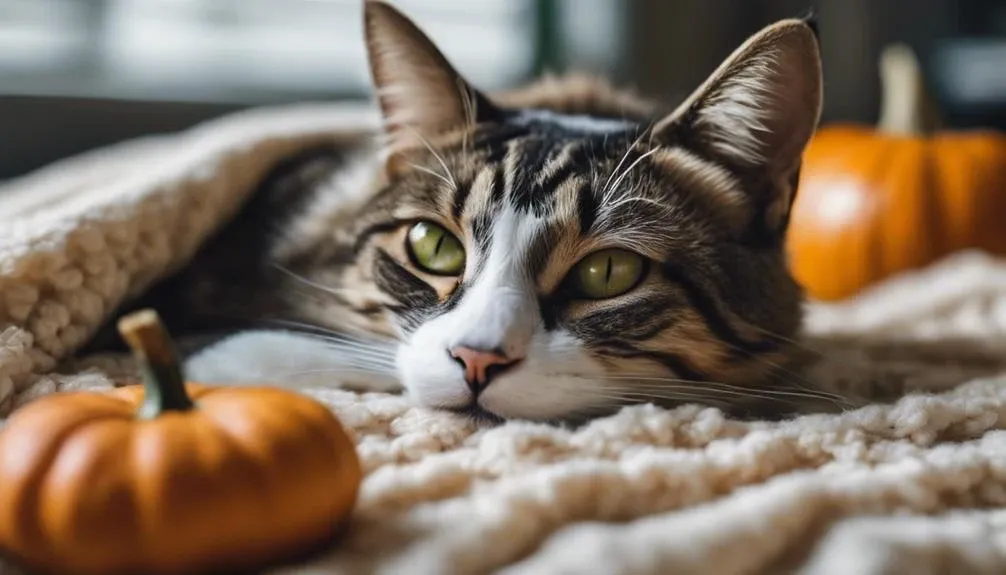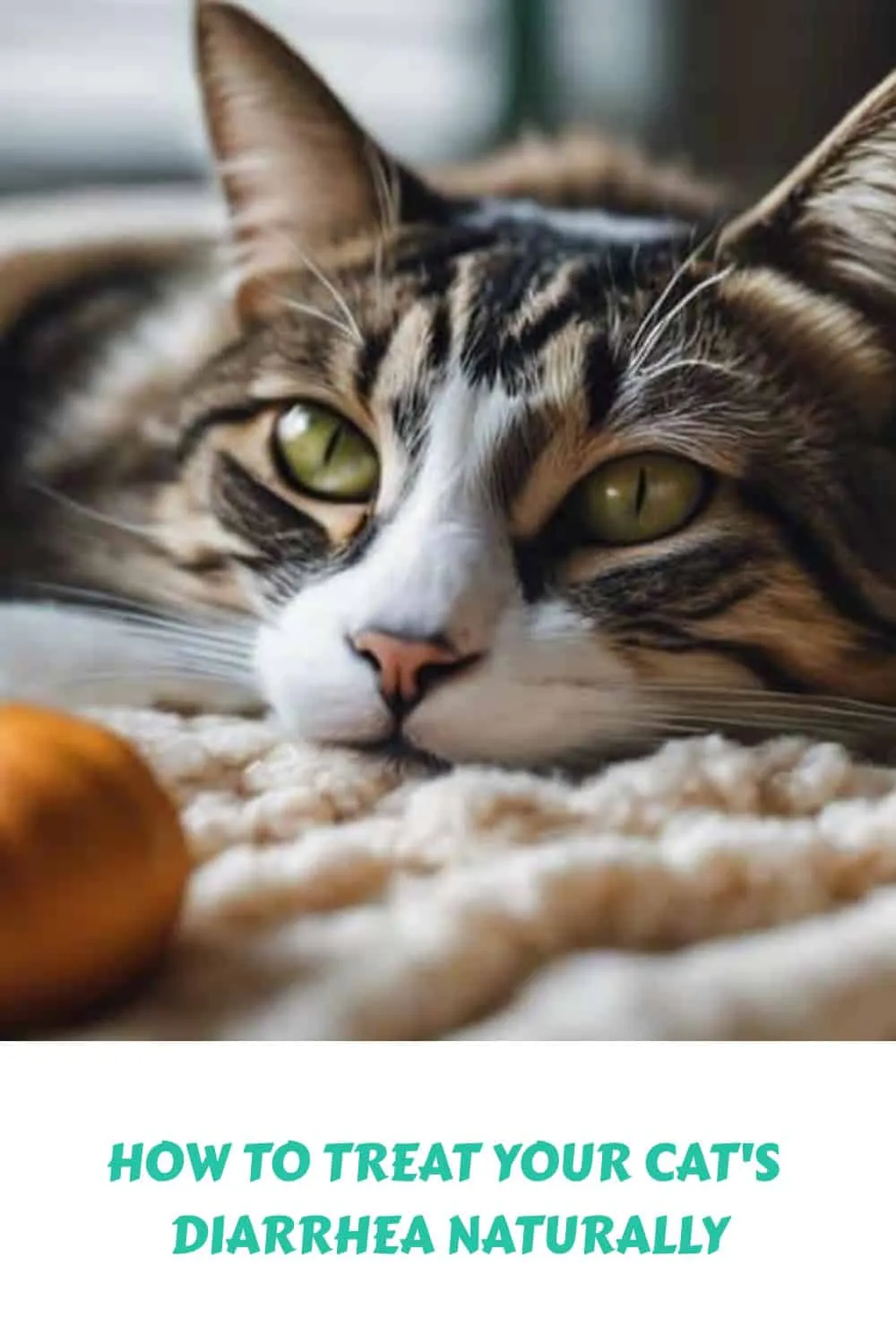The Best Fluffy Pancakes recipe you will fall in love with. Full of tips and tricks to help you make the best pancakes.

When your feline friend isn't feeling their best in the digestive department, it's essential to consider natural remedies for their discomfort.
From dietary adjustments to herbal solutions, there are various approaches to address your cat's diarrhea with gentle care.
Understanding the root cause and implementing holistic methods can bring relief to your furry companion in a nurturing way.
But what are these natural remedies, and how can they help your cat get back on track?
Key Takeaways
- Manage cat diarrhea naturally through dietary adjustments and herbal remedies.
- Ensure proper hydration and create a stress-free environment for your cat's recovery.
- Avoid harmful medications and seek veterinary care for severe or persistent symptoms.
- Recognize dehydration signs and promote digestive health with a balanced, hypoallergenic diet.
Common Causes of Cat Diarrhea
When diagnosing your cat's diarrhea, it's essential to consider common causes such as:
- Dietary changes
- Food allergies
- Intestinal parasites
- Bacterial infections
- Stress or anxiety
Diarrhea in cats can be triggered by various factors, including sudden changes in their food, which may not agree with their digestive system. Food intolerances to certain ingredients like lactose, gluten, or specific proteins can also lead to gastrointestinal issues.
Additionally, infections caused by pathogens such as giardia, salmonella, or campylobacter are known culprits of diarrhea in cats. Moreover, stressors like moving to a new home, introducing a new pet, or experiencing loud noises can disrupt your feline friend's digestive health, resulting in diarrhea.
Understanding the root cause of your cat's diarrhea is crucial in determining the appropriate course of action, whether it be through home remedies, dietary adjustments, or seeking veterinary care for bacterial infections or parasites. By identifying and addressing these common triggers, you can help alleviate your cat's discomfort and promote their overall well-being.
Understanding Your Cat's Symptoms
To understand your cat's symptoms of diarrhea, observe for increased frequency of bowel movements, loose or watery stools, vomiting, lethargy, and dehydration. Additionally, look out for signs like blood in the stool, changes in appetite, and elevated body temperature, which may indicate a need for veterinary attention.
Cats experiencing diarrhea may display discomfort through behaviors such as abdominal pain, excessive grooming, or hiding. Monitoring your cat's litter box habits, water intake, and overall activity level can provide insights into the severity of the diarrhea. Recognizing these symptoms early on and seeking prompt veterinary care is crucial to prevent complications and ensure effective treatment.
Dietary Changes to Alleviate Diarrhea
Consider gradually transitioning your cat to a bland diet like boiled chicken and rice to ease digestion and reduce diarrhea. Dietary changes play a crucial role in alleviating your cat's discomfort. Here are essential steps to adjust your cat's diet effectively:
- Hypoallergenic Diet: Opt for hypoallergenic cat food to address potential food allergies causing diarrhea and promote gut health.
- Fiber Adjustment: Modify your cat's fiber intake based on the severity of diarrhea. Choose low-fiber options for mild cases and high-fiber diets for more severe issues.
- Adequate Hydration: Ensure your cat has access to plenty of water and electrolytes to prevent dehydration and support overall digestive health during diarrhea episodes.
Herbal Remedies for Digestive Health
To promote your cat's digestive health naturally, incorporating herbal remedies like slippery elm, marshmallow root, and chamomile can be beneficial in soothing the digestive system and reducing inflammation during episodes of diarrhea. These herbs offer unique properties that aid in calming the stomach and intestines, alleviating discomfort, and supporting overall gut health. Here is a table outlining the benefits of each herbal remedy:
| Herbal Remedy | Benefits | Form |
|---|---|---|
| Slippery Elm | Coats digestive tract, eases irritation | Tincture, capsule, tea |
| Marshmallow Root | Forms protective layer, reduces inflammation | Tincture, capsule, tea |
| Chamomile | Anti-inflammatory, calming effects | Tincture, capsule, tea |
Importance of Proper Hydration
Ensuring your cat stays well-hydrated is essential for managing diarrhea and maintaining their overall health. Proper hydration plays a vital role in preventing dehydration and supporting various bodily functions in your feline friend.
Here are three key points highlighting the importance of proper hydration:
- Dehydration Symptoms: Diarrhea can lead to fluid loss, putting your cat at risk of dehydration. Watch out for signs such as lethargy, sunken eyes, dry mouth, and decreased skin elasticity, as these could indicate your cat needs more fluids.
- Encouragement to Drink Water: Cats may be less inclined to drink water when experiencing diarrhea. To encourage hydration, consider placing multiple water bowls around the house, using a pet fountain to pique their interest, or offering wet food to increase their moisture intake.
- Electrolyte-Rich Fluids: In cases of dehydration, providing electrolyte-rich fluids like diluted chicken broth can help replenish lost nutrients and aid in recovery by restoring essential minerals. Be sure to consult your veterinarian for guidance on proper hydration techniques tailored to your cat's specific needs.
Probiotics for Gut Health
When it comes to your cat's gut health, probiotics play a crucial role in maintaining a balanced digestive system. Choosing the right strain of probiotics can offer numerous benefits, such as aiding digestion and reducing inflammation in the gut.
Incorporating probiotics into your cat's diet can promote overall gastrointestinal health and help prevent episodes of diarrhea.
Benefits of Probiotics
Beneficial bacteria known as probiotics play a crucial role in restoring and maintaining a healthy balance in your cat's gut flora. Here are some benefits of probiotics for your furry friend:
- Digestive Health: Probiotics aid in digestion and nutrient absorption, promoting a healthy gut environment.
- Immune System Function: By supporting the growth of good bacteria, probiotics help strengthen your cat's immune system.
- Alleviating Diarrhea Symptoms: Research shows that probiotics can reduce inflammation in the gastrointestinal tract and alleviate symptoms of diarrhea in cats.
Incorporating probiotics into your cat's diet can be a natural and effective way to improve their overall gut health and well-being.
Choosing the Right Strain
To ensure optimal gut health for your cat, it's crucial to carefully select probiotics with specific strains like Lactobacillus acidophilus and Bifidobacterium animalis. These probiotics are beneficial for your cat's digestive system, aiding in the restoration of beneficial bacteria and helping to reduce diarrhea. Different strains offer unique advantages, such as supporting immune function and improving stool consistency.
When choosing a probiotic, opt for formulations designed specifically for cats to ensure the right bacterial balance for their gut health. Consulting with your veterinarian is essential to determine the best probiotic strain and dosage tailored to your cat's individual needs and condition. By selecting the right probiotic strain, you can support your cat's gut health and overall well-being effectively.
Creating a Comfortable Environment
To create a comfortable environment for your cat with diarrhea, ensure they've a calm space with cozy sleeping spots. Keep their litter box clean and provide quiet resting areas to promote relaxation and aid in their recovery.
Offering a tranquil setting can help reduce stress levels, aiding in your cat's overall well-being and recovery process.
Calm Space for Cat
Creating a serene environment for your cat is essential in aiding their recovery from diarrhea. To provide a calm space for your cat, follow these tips:
- Stress-Free Room: Set up a quiet area away from loud noises and stressors where your cat can relax undisturbed.
- Cozy Sleeping Spots: Ensure there are comfortable and warm sleeping areas for your cat to rest and recuperate.
- Promote Rest: Encourage your cat to rest by providing cozy blankets and familiar toys to make them feel secure and comfortable.
Clean Litter Box
Regularly maintaining a clean litter box is crucial to ensure your cat's comfort and well-being, especially when they're dealing with diarrhea. A dirty litter box can worsen gastrointestinal issues and stress for cats suffering from diarrhea.
To provide a hygienic environment, scoop and clean the litter box frequently. Opt for unscented litter to prevent overwhelming your cat's senses during this sensitive time. Make sure the litter box is easily accessible and located in a quiet, private area to promote relaxation.
Quiet Resting Areas
For optimal recovery from diarrhea, ensure your cat has peaceful resting areas that promote relaxation and comfort. Creating a stress-free environment is crucial for your feline friend to recuperate effectively. Here's how you can set up quiet resting spots to aid in your cat's recovery:
- Cozy Sleeping Spots: Provide comfortable and cozy sleeping areas where your cat can rest undisturbed.
- Avoid Stressors: Keep the environment calm by minimizing loud noises and stressful stimuli.
- Essential Rest: Allow your cat plenty of rest to support their healing process and overall well-being.
Avoiding Harmful Human Medications
To safeguard your cat's health, it is crucial to steer clear of using harmful human medications when treating their diarrhea. Human over-the-counter diarrhea products contain ingredients that can be toxic to cats and may cause adverse reactions due to their unique digestive systems. Self-medicating your cat with human drugs can lead to complications as the dosage and ingredients may not be safe for feline consumption. Opt for vet-approved medications specifically designed for cats to ensure effective treatment without risking their health. Consulting a veterinarian before administering any medication is vital to prevent unintentional harm and to prioritize your cat's well-being.
| Harmful Human Medications | Risks |
|---|---|
| Over-the-counter drugs | Toxic ingredients harmful to cats |
| Improper dosage | Adverse reactions in cats' unique digestive systems |
| Lack of feline-specific formulations | Complications due to unsafe ingredients for cats |
When to Seek Veterinary Care
If your cat's diarrhea persists for more than 24 hours, seeking veterinary care is crucial to ensure prompt and appropriate treatment. Here are some key points to help you understand when it's necessary to go to the vet:
- Persistent Symptoms: If your cat's diarrhea continues for more than a day despite home remedies, it's essential to consult a veterinarian for a proper diagnosis and treatment plan.
- Alarming Signs: Immediate attention is required if you notice bloody diarrhea, black, tar-like stool, or worms in the stool. These could indicate serious underlying issues that need veterinary care.
- Behavioral Changes: Lethargy, loss of appetite, vomiting, or significant behavior changes shouldn't be ignored. These signs may signal a more severe condition that requires professional intervention.
Frequently Asked Questions
What Can I Give My Cat for Diarrhea Home Remedy?
For your cat's diarrhea, remember to use probiotic supplements, herbal remedies, pumpkin puree, a bland diet, and hydration tips. Keep stress low. Avoid human medications. Stick to natural solutions for your feline friend's well-being.
How Can I Firm up My Cats Stool?
To firm up your cat's stool, consider dietary changes like adding fiber supplements or low-fiber diets. Probiotic supplements can aid gut health. Ensure hydration with water or broth. Stress management, exercise, and vet consultation are crucial.
What Stops Diarrhea Fast Naturally?
To stop diarrhea fast naturally, consider herbal remedies, probiotic supplements, dietary changes, hydration tips, stress management, and other natural remedies. These methods can help alleviate your cat's symptoms and restore their digestive health quickly and effectively.
How Can I Stop My Cat Having Diarrhoea?
To stop your cat from having diarrhea, focus on dietary changes like bland foods, consider probiotic supplements, ensure hydration, manage stress, explore natural remedies, and seek vet advice. Monitor closely for improvement and adjust accordingly.
Conclusion
In conclusion, treating your cat's diarrhea naturally involves understanding the potential causes, managing symptoms, making dietary adjustments, and providing proper hydration and probiotics.
Creating a comfortable environment for your cat's recovery is essential, along with avoiding harmful human medications. Remember to seek veterinary care if diarrhea persists for more than 24 hours.
By following these steps, you can help your feline friend feel better and get back to their playful self.










